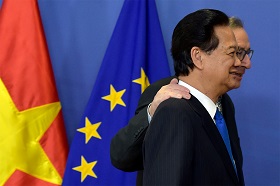The Vietnam Communist Party (VCP) held its 12th National Congress in Hanoi from 20-28 January. The foreign news media devoted the lion’s share of attention on the contestation for the post of VCP Secretary General between incumbent Nguyen Phu Trong and challenger Prime Minister Nguyen Tan Dung. The real issue was not about ideological differences but about collective leadership by the party over the government apparatus and Cabinet.
The Vietnam Communist Party (VCP) held its 12th National Congress in Hanoi from 20-28 January. The foreign news media devoted the lion’s share of attention on the contestation for the post of VCP Secretary General between incumbent Nguyen Phu Trong and challenger Prime Minister Nguyen Tan Dung. The real issue was not about ideological differences but about collective leadership by the party over the government apparatus and Cabinet.
Vietnam's top-down one-party system is sclerotic. Every five years when a national party congress is held there is only a small pool of Politburo members who are eligible to contest the post of party leader under current rules. These rules do not permit a person to serve more than two terms in office and they require party members to retire when they reach 65 years of age. An exemption can be granted in exceptional circumstances.
In the outgoing Politburo only six members out of sixteen were eligible for re-election. Prime Minister Dung reportedly sought an exemption so he could contest the top party post. He was blocked by a majority of the Politburo who spent 2015 crafting internal rules to prevent this possibility. Dung’s Politburo comrades drew up a stringent list of criteria for election to the new Central Committee, a prerequisite for election to the Politburo and party Secretary General. Dung was criticized for a number of faults including failure to reign in corruption, economic mismanagement, and inability to be a team player.
On the eve of the 12th Congress at the Central Committee’s fourteenth plenum met to approve the list of candidates for the new Central Committee. According to the BBC the Central Committee voted thirteen times before reaching a decision. Dung failed to make the list. He was also bound by rules preventing self-nomination from the floor of the congress.
As the congress opened a party official announced that there was no age limit on the Secretary General and that the only criterion for selection was that the candidate be outstanding. The Central Committee duly voted to give 72 year-old incumbent Secretary General Trong a second exemption so he could serve another term. It is widely believed that Trong will step down by mid-term to make way for a new leader.
Trong’s re-election as party leader is an illustration of the sclerotic nature of Vietnam’s one-party leadership. In other words, not one of the six eligible members of the outgoing Politburo was deemed qualified to be the new Secretary General.
The 12th Congress voted to expand the Politburo to nineteen members. Their average age is 59.7 years. If the 13th VCP National Congress is held in early 2021 once again there will be only six members under 65 years and thus eligible to stand for party leader under current rules.
Vietnam needs to improve inner party democracy and transparency. On the last day of the congress Secretary General Trong extolled the virtues of democratic centralism and collective leadership.
At the 10th National Congress in 2006 party delegates demanded a choice for party leader. This was denied but they were able to conduct a straw poll. The results were given to the new Central Committee to use in their selection of party Secretary General. At the 12th Congress a handful of deputies were overridden when they attempted to place Nguyen Tan Dung’s name on the ballot for party leader.
Vietnam is now possibly entering a two-year transition period during which new government ministers – including a new prime minister – and top party officials will have to look over their shoulders to see who the next party Secretary General will be. It remains to be seen if Vietnam’s top-down “democratic centralism” is the best method for choosing a party leader as Vietnam pursues proactive international integration.






